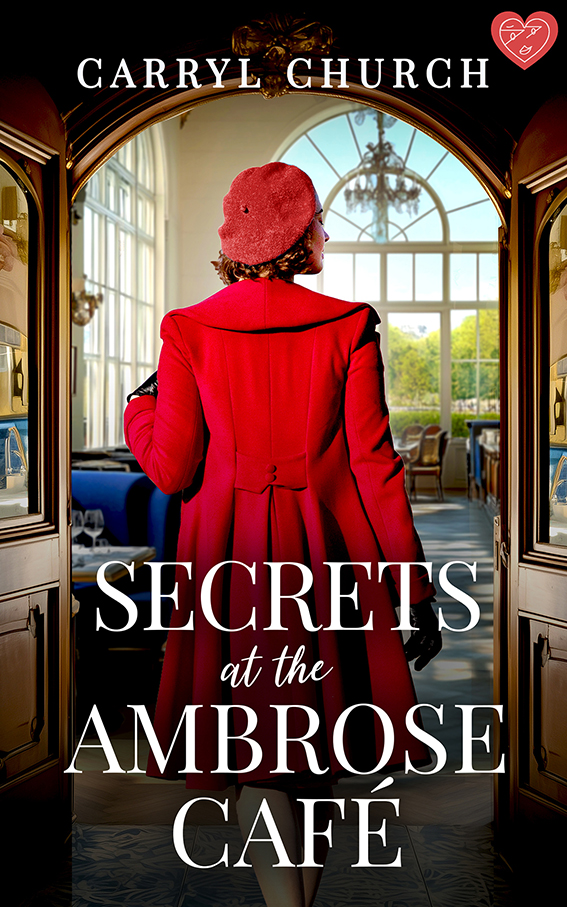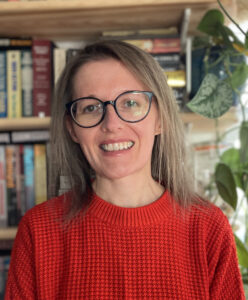Today I’m delighted to be interviewing author, Carryl Church, about her second historical novel, Secrets at the Ambrose Café.
Grab a cuppa and put your feet up for five minutes, and come and say hello.
What inspired you to write Secrets at the Ambrose Café?
The 1920s has held a fascination for me since my teenage years when two of my favourite television series were The House of Eliott and Jeeves and Wooster – I read the novels too! I relished the idea of setting a story in that period.
Inspiration for me often starts with a location. In the case of this book, it was Deller’s Café – a chain of beautiful catering establishments with branches in Exeter, Paignton and Taunton. The main Exeter branch in particular really captured my imagination. Built in the baroque style and with a decadent interior encompassing many architectural features – it was said to be one of the finest buildings in Exeter. In Agatha Christie’s novel The Sittaford Mystery, her characters visit Deller’s Café in a chapter bearing the cafe’s name. Sadly, Deller’s was damaged by an incendiary bomb in the Exeter Blitz of 1942 and demolished in the subsequent rehabilitation of the High Street – a loss still keenly felt.
I wanted the artistic freedom to make the location my own, so The Ambrose Café was born, but I named my character Della in a nod to the wonderful institution that inspired the story. As soon as I saw my book cover, I was delighted that it captured the sumptuous café of my imagination so well.
What type of research did you have to do for your book?
I started with the Exeter Memories website which is a great resource if you’re interested in the history of the city. I then found a website dedicated to Deller’s Café which included wonderful photographs of the interiors, staff, details of the menus and numerous banquets the café hosted.
For a more detailed look at the 1920s, my background as a Film and Photography Archivist was a great help. I searched the National Archives database and discovered a series they’d produced called ‘the roaring twenties’ which offered fantastic insight into the period gleaned from the 1921 census. For building an authentic picture of post WW1 society and the political and psychological impact of the war, I searched the Imperial War Museum database and listened to oral histories. I worked for the Imperial War Museum as an Archivist many years ago and had seen footage from the period to draw upon too. I also read widely around the subject and although Deller’s Café is no longer there, I visited the locations in Exeter.
Do you model any of your characters after people you know? If so, do these people see themselves in your characters?
I can honestly say I never consciously model my characters on people I know. I think if I did, I’d find it too restrictive. I figure out who my characters are by writing them. I always knew this book would be about two women. I could see Della in her apron working away in the kitchen and the rest grew from there.
Which Point of View do you prefer to write in and why?
Close third person comes naturally. I’ve written short stories in first person, but I prefer to stick with what works for me. However, I enjoy reading in a variety of POV.
Do you prefer to plot your story or just go with the flow?
A little of both. When I first started writing, I’d just see where the story took me which meant I often disappeared down a few blind alleys. Now I appreciate the benefit of having a framework and an idea of where the story is going but I like to leave room for my characters to surprise me. It makes them feel more alive on the page.
What is your writing regime?
I tend to write seven days a week and I’m not very good at taking breaks. I’m up early to get my son to school. I have a writing room in our attic, and I’m usually at my laptop by 7am where I’ll eat breakfast. If I’m in the midst of the story and its flowing or I’m editing, I’ll often get thirty to forty minutes done and find it quite a productive time before getting organised for the school run. Once I’m back, I’ll go for a walk then I’m at my desk for the rest of the morning. I have a back and neck injury, so I have to take regular breaks but sometimes I forget and pay for it later. In the afternoons I tend to focus on other things like admin or research. I usually have a second burst of writing in the evening followed by some yoga to try and undo the damage I’ve done sitting at my desk for too long! At weekends this is broken up by family time, but I still take the opportunity to slip away and write when I can. As soon as one book is finished, I’ll start on the next.
What excites you most about your book?
The characters. One in particular – Mr Gillespie. I won’t give any spoilers, but he almost wrote himself and at times I had to stop him stealing every scene! He brought me a lot of joy.
Blurb:
Two women. Two different worlds. One secret that could ruin them both.
Exeter, 1925. Della Wilde has set aside her dream of moving to Paris to study at the renowned Le Cordon Bleu, choosing instead to support her family torn apart by war. By day, she works at the prestigious Ambrose Café, serving the city’s elite — she feels utterly invisible. Until a chance encounter with rebellious Alice Winters, the daughter of a powerful MP, upends Della’s world.
Alice is a woman caught between duty and desire. She secretly yearns to be an artist but is expected to marry a respectable suitor and raise a family. Della, with her sharp wit and quiet strength, is unlike anyone she has ever known. She makes Alice feel alive.
So she draws Della into her orbit — first as a muse for her secret art, then as something infinitely more intimate. But in a world where reputations are easily shattered, their growing bond is a danger that threatens not only their futures, but those around them.
As Alice risks scandal and Della faces the consequences of following her heart, they must decide: will they allow others to choose their path, or dare to forge their own?
This historical tale of courage, forbidden love and self-discovery is perfect for fans of Sarah Waters, Cynthia Ellingsen, Fiona Valpy or Rhys Bowen.
You can buy Secrets at the Ambrose Café from all good retailers, including Amazon: https://amzn.eu/d/dIlEnja
Carryl writes historical fiction with a focus on the 20th Century. Her writing explores love in turbulent times, both romantic and familial. The people we’re given and those we choose for ourselves.
An early fascination with cinema led to a career as a Film and Photography Archivist. Years spent watching archive footage gave her a unique insight into how people lived in the early 20th century now brought vividly to life in her stories.
Originally from the Isle of Wight, Carryl now lives in Devon. The local landscape and locations are an inspiration for her novels. Carryl has a BA in Media and Literature and an MA in Film and Television Archiving. After working in Media Archives for seventeen years, including The Imperial War Museum and The BBC, she now writes full-time in the company of her cat, Ditsy.
Website: https://carrylchurch.co.uk/
Instagram: @CarrylChurch
Facebook: Carryl Church
Many thanks for joining us today Carryl.
Happy reading everyone,
Jenny xx




